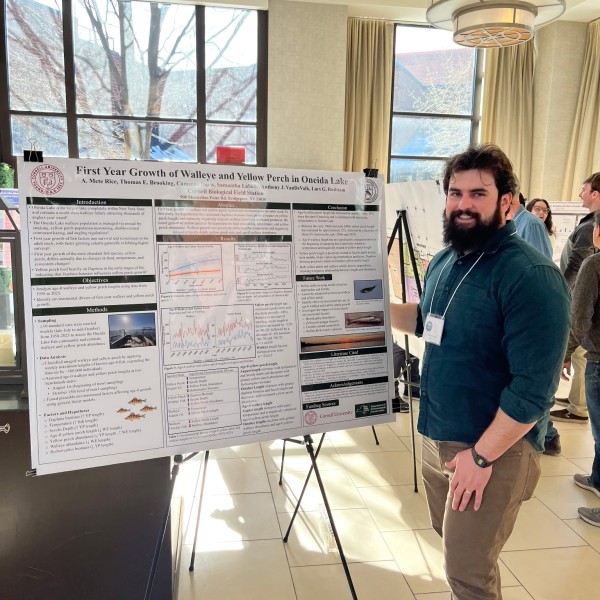As Community Food Systems minors, students engage with community-based organizations to gain rich, hands-on experiences in the food system. This narrative is a reflection of Hannah Rudt ‘23’s practicum experience with The Boys and Girls Club of Harlem.
The Boys and Girls Club of Harlem (BGCH) is a branch of the Boys and Girls Club of America that serves youth in Harlem, New York City. BGCH believes that “success is within reach for every young person that walks through our doors” and provides programming for majority low-income adolescents of color.
In partnership with the Leak Research Group (P.I. Dr. Tashara Leak), a Cornell research lab that conducts community-based interventions addressing socioeconomic and environmental influences on food choices, students at the BGCH participated in a food justice and youth advocacy program facilitated by Hannah and other research team members. Students at BGCH learned about nutrition and community activism to understand inequities in their food environment. They conducted photojournalism at local bodegas (corner stores) and presented their findings to a panel of NYC public health experts and community members. More information about the program can be found here.
This story recounts Hannah’s experience meeting the funders of the BGCH food justice program. The research team grapples with a disconnect between the messaging of the program and the messaging of the funders. The intention of this story is not to reduce the generous donation of the funders, but to vocalize feelings that can arise when faced with hypocrisy in the food system, especially when the hypocrisy is necessary for funding.
The heads of every student and research team member turn at the clicking of heels. A slim, blond woman and her muscular husband enter the classroom. We had spent the past three weeks making this room at the Boys and Girls Club of Harlem a warm space, and suddenly it feels sterile. The students sit up straighter and stop fidgeting with the bottle caps of the rejected green juices in front of them.
The glowing newcomers are actually not strangers at all--they funded the entire summer education and research program. The owners of a New York City based clean “juicery” are visiting the Boys and Girls Club to see the impact they are making on the lives of the adolescents sitting in front of them. The only impact they see right now is a collective recoil that could only be caused by unfamiliarity, fear, and an understanding of power dynamics. The students are good at understanding power dynamics; what had once been a lively room of laughter and shrieking as we tasted the juice is now silent.
After introductions, a speech about accessibility begins. The students are confused; the research team members are silently dumbfounded. Recommending an app that helps the students buy $10 green juice for $7 is surely not the accessibility we had been learning about for the past three weeks. The ideas we had cultivated about community participation, activism, and food justice are nowhere near the universe of pressed celery and gluten-free energy bites that is being discussed in the classroom on this day.
The muscular husband talks about running a business. The students perk up at the idea of making money. They seem to have missed the part of the story in which the husband and wife already have the money to buy an existing juicery to start the business. The husband and wife brush over the fact that their juicery does not exist above 96th street. We are on 145th street. There is a local juice shop next to the Boys and Girls Club. Nobody says that this small business is making healthy snacks more accessible.
The husband and wife ask if the students liked the juice. Eyes dart quickly, masked smiles are suppressed, and the research team doesn’t know how to silently allow or prohibit the honest feedback of the students. One student raises their hand, says the juice was “delicious.” Another student raises their hand and says they “tasted a lot of kale.” Nobody says they will take a subway down to 96th street to get another green juice.
A long hour passes. Heels finally click out of the room. A collective sigh is released, but the room is still frigid around the edges. Hopefully tomorrow’s sun can thaw the uncertainty that was introduced into the classroom. Nikes and Adidas shuffle towards the exit. A collective sharp inhale cuts through the research team.
We are also confused. We are disappointed. The disconnect between the funders and the program curriculum feels significant, but the program has already been funded and the curriculum has already been taught. Tomorrow, we will sip more free green juice while we learn about Harlem bodegas.
About the author
Hannah Rudt ‘23 is a student in the College of Agriculture and Life Sciences studying Information Science and Community Food Systems. Growing up in New York City, she learned about inequitable food systems at a young age, seeing how a lack of access to nutritious food affected her communities. Hannah is interested in using data science to improve food systems and she is passionate about uplifting the voices of those who are impacted by health disparities through community-based projects. Since February 2020, she has worked on qualitative public health and nutrition studies with the Leak Research Group, which inspired her commitment to CFS. Outside of school, Hannah enjoys baking challah, playing guitar, and (slowly) completing triathlons.
Read the entire Community Food Systems 2022 narrative series.





